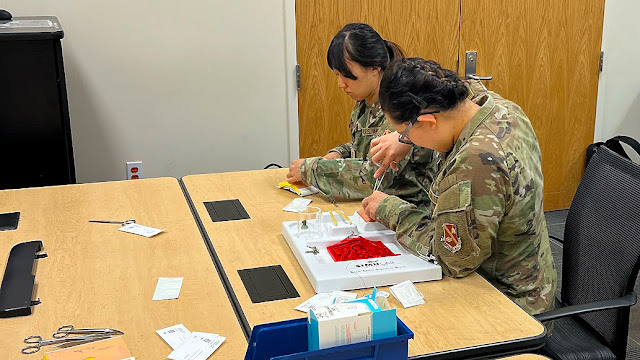Gynecologic Surgery & Obstetrics Student Interest Group: Paving the Way for Career Success
The Gynecological Surgery & Obstetrics (GSO) Student Interest Group (SIG) at the Uniformed Services University (USU) introduces students to the world of GSO and its various subspecialties, increases awareness about reproductive health issues, provides an avenue of service, and helps prepare students on their path to residency.
 |
| Suturing and knot tying simulation. (Photo courtesy of GSO-SIG, USU) |
February 6, 2024 by Vivian Mason
“What is GSO really like?”
USU’s Gynecologic Surgery & Obstetrics (GSO) Student Interest Group (SIG) was created to help answer that question.
 |
Students participating in a Diaper Drive. (Photo courtesy of GSO-SIG, USU) |
Air Force Maj. (Dr.) Danielle Wright-Terrell, advanced clerkship director in the GSO department, and lead faculty advisor for the GSO-SIG, says that, “GSO-SIG is dedicated to helping students gain an understanding of what’s involved in a GSO career. We also inform medical students at all stages of training about the rewards and opportunities available as a physician in reproductive healthcare.”
GSO-SIG introduces students to the world of GSO and its various subspecialties, increases awareness about reproductive health issues, provides an avenue of service, and helps prepare students on their path to residency.
“OB/GYNs offer care to patients at all stages of their lives,” Wright-Terrell explains. “Therefore, it’s important that the GSO-SIG helps students learn key concepts in reproductive healthcare related to health maintenance and disease prevention. It’s also essential for our organization to promote clinical skills in reproductive health, strengthen interdisciplinary efforts related to reproductive health research, and increase reproductive health advocacy within our military system and community.”
She believes that one of the primary attractions to GSO-SIG is “the hands-on experience that we offer and the simulations. Students look forward to learning what they’ll need in the medical setting.” In addition, incoming students can count on shadowing, volunteering, clinical activities, education and research opportunities, and mentorship.
“We have two co-presidents who are medical students,” Wright-Terrell adds. I work closely with them to structure the curriculum of the interest group for the year, as well as make good use of the helpful resources the medical school has to offer.”
Shadowing & Clinical Activities
“We encourage students to take this opportunity to experience something new,” exclaims Wright-Terrell. “It’s a great way to broaden your medical experiences and improve your understanding of GSO, interact with patients, and learn from mentors. Shadowing can give you a better understanding of what a gynecologist's typical day is like, it will help you understand the profession better, it can strengthen your motivation, and it can help you learn proper bedside manners, as well as understand the realities of medicine.”
During a shadowing experience, students have the chance to observe and assist with patient care and interact with healthcare professionals. Shadowing can provide valuable insight into the demands and rewards of a career in GSO, as well as help students build their knowledge and skills in the field.
GSO-SIG conducts procedure labs, where students have the opportunity to participate in simulated IUD placements, knot tying, pelvic and speculum exams, and suturing. Remarks Wright-Terrell, “We also try and provide an avenue for students to do research and learn how to become investigators and problem-solvers.”
 |
| Students working on a pelvic exam simulation. (Photo courtesy of GSO-SIG, USU) |
Volunteering
Volunteering can provide both personal fulfillment and educational benefits. Volunteer service offers opportunities for enhanced interpersonal and leadership skills. This first-hand experience is invaluable, providing students with an understanding of the technical aspects of medicine and the critical thinking required to diagnose and treat patients.
“We completed a community diaper drive that also yielded monetary donations,” says Wright-Terrell, “as well as conducted a feminine hygiene product drive. Both were quite successful.”
GSO-SIG started a partnership with SOME (So Others Might Eat) in Washington, D.C. It’s a nonprofit that provides low-income veteran families and others with multiple resources, including housing, healthcare, education, and workforce development.
“We partnered with them at Karen’s House,” explains Wright-Terrell, “to provide educational sessions to the female residents there. We discuss various gynecological issues, like menopause, breast awareness, STD prevention, etc.”
Mentorship
When asked how she decided on GSO as her specialty, Wright-Terrell says, “I chose to become an OB/GYN because I found the subject matter deeply fascinating, and I wanted a specialty that would allow me to complete a diverse array of procedures in an outpatient setting.”
Mentors can help a student develop clinical skills and career goals, and can be the best judge of a student’s needs or level of training. With an enthusiastic, experienced mentor, students get the opportunity to see many levels of medicine being practiced.
“GSO-SIG provides mentorship to students so they can be exposed to gynecologic surgery and obstetrics,” says Wright-Terrell. Mentors can help students acclimate to their environment and learn more about the profession, as well as get connected to others in the field.
“I didn’t have this kind of exposure at all in medical school,” Wright-Terrell concludes. There was no hands-on experience. There was no formal mentoring nor formal shadowing. But at USU, we’re definitely providing opportunities and the chance for you to get your hands wet and find out if GSO is for you.”
 |
| Some of the members of the GSO-SIG. (Photo courtesy of GSO-SIG, USU) |

